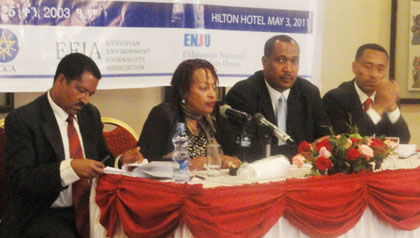New York, May 5, 2011–Officials in Ethiopia hijacked a local UNESCO-sponsored World Press Freedom Day event, installing government-backed journalists as speakers and nixing independent journalists slated to speak. There was no discussion, as originally planned, of this year’s global theme on new media and the Internet at the Tuesday forum, according to local sources and news reports.
The program for the event at Addis Ababa’s Hilton Hotel had called for the veteran editor of the bilingual weekly Reporter, Amare Aregawi, to deliver a presentation on UNESCO‘s 2011 global theme for World Press Freedom Day, “21st Century Media: New Frontiers, New Barriers,” Jean-Pierre Ilboudo, a local UNESCO regional adviser on communications, told CPJ.
Instead, after opening remarks by representatives of the United Nations, the African Union, and UNESCO, and a presentation by pro-government veteran broadcaster Mimi Sebhatu, officials distributed an altered agenda prepared by the Office of Government Communication Affairs. The new agenda excluded Aregawi and other scheduled moderators and speakers, including editor Dawit Kebede, a 2010 winner of CPJ’s International Press Freedom Award, according to local journalists. They were replaced with officials and pro-government media journalists, including journalist Biruk Kebede from the ruling EPRDF-sponsored Fana Broadcasting Corporation, who became the event’s moderator.
Independent journalists walked out in response.
“The irony of censoring World Press Freedom Day will not be lost on the leadership of the United Nations, which has spent the past three days emphasizing the need for freedom of expression,” said CPJ Africa Advocacy Coordinator Mohamed Keita. “By hijacking this event, Ethiopia has again put its appalling record of media repression on display for the whole world.”
Before Tuesday, the Ethiopian Office of Government Communication Affairs contacted organizers of the World Press Freedom Day event and threatened to disperse the meeting by force if the agenda wasn’t amended, according to local journalists. The office asked organizers to change out moderators like Kebede, drop presentations critical of the authorities, and give more time to government officials, according to local journalists. The organizers refused. On Tuesday, officials including State Minister Shimelis Kemal, Desta Tesfaw from the government-controlled Ethiopian Broadcasting Authority, and leaders of government-controlled press unions like Anteneh Abraham of the Ethiopian National Journalists Union and Wondwossen Mekonnen of Ethiopian Free Journalists Association took over the event.
Tuesday’s incident coincided with CPJ’s release of a report (“The 10 Tools of Online Oppressors”) that highlighted the Ethiopian government’s tight control of the Internet. On that day, coincidentally, websites discussing political dissent and human rights–which are typically accessible only through proxy servers in Ethiopia–were suddenly unblocked, according to local journalists.
The Ethiopian government, which has for years censored the Internet under its stranglehold of the country’s telecom infrastructure, has shown that it is fearful of an Egypt-style Internet-fueled popular uprising, particularly with cyber-activists calling for mass protests in May. In February, the government briefly detained and threatened persecuted columnist Eskinder Nega over articles that compared the popular uprising in Egypt with the 2005 anti-government protests in Ethiopia.
